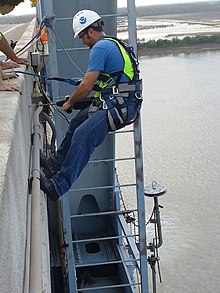
Back حزام حماية من السقوط Arabic Talabard Catalan Absturzsicherung (Mensch) German Arnés de seguridad Spanish Harnais French Rungkup pengaman ID Öryggisbelti Icelandic 安全帯 Japanese 安全帶 (高空) ZH-YUE
This article has multiple issues. Please help improve it or discuss these issues on the talk page. (Learn how and when to remove these messages)
|

A safety harness is a form of protective equipment designed to safeguard the user from injury or death from falling. The core item of a fall arrest system, the harness is usually fabricated from rope, braided wire cable, or synthetic webbing. It is attached securely to a stationary object directly by a locking device or indirectly via a rope, cable, or webbing and one or more locking devices. Some safety harnesses are used in combination with a shock-absorbing lanyard, which is used to regulate deceleration and thereby prevent a serious G-force injury when the end of the rope is reached.
An unrelated use with a materially different arresting mechanism is bungee jumping. Though they share certain similar attributes, a safety harness is not to be confused with a climbing harness used for mountaineering, rock climbing, and climbing gyms. Specialized harnesses for animal rescue or transfer, as from a dock to a vessel, are also made.
Safety harnesses have restraints that prevent the wearer from falling from a height. By wearing the belt or harness the risk of injury from a fall is greatly reduced. The harness allows the user to attach themselves to an object that is stationary, ensuring they will not hit the ground in the event of a possible fall. Falling from high areas is one of the most common causes of injuries in the workplace, so it is very important to make sure you are properly equipped when working up high.
Before safety harnesses were required by OSHA (The Occupational Safety and Health Administration), workers wore body belts to connect to fall protection systems. Workers had the belts fastened around the waist, resulting in the entire force being exerted on the abdomen and often causing significant injury.
OSHA implementing this requirement really made sure the amount of casualties decreased from falling, as well as injuries caused from the old belts they used to wear. Safety harnesses are essential while working in high areas to prevent significant injury or death, and OSHA making these a requirement made everyone understand the importance of safety-harnesses